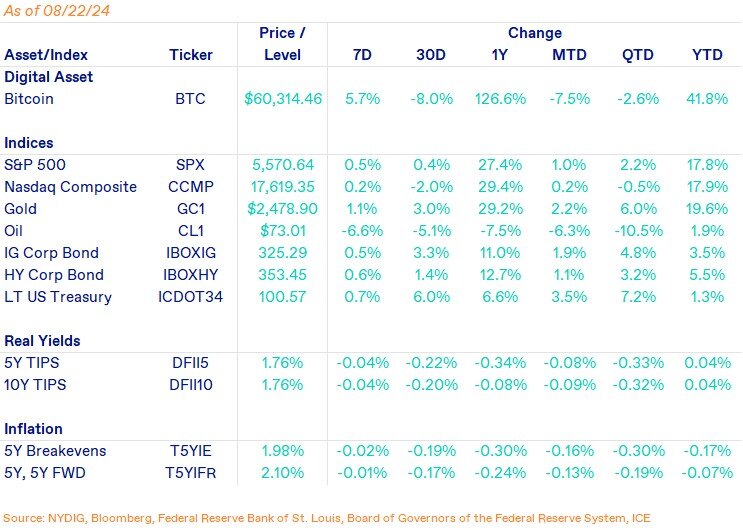IN TODAY'S ISSUE:
- Quarterly ETF holdings data reveals that most investor types were buying during the quarter, even as price fell.
- Investment advisors were the biggest purchasers during Q2, followed by retail (non-filers) and hedge funds.
- Investment advisors and retail were likely driven by the expression of directional trades while hedge funds were likely driven by the availability of arbitrage opportunities.
Holdings Data Shows Most Investor Categories Bought in Q2
Form 13F share ownership reports for Q2 were due at the end of last week, giving us a glimpse into what investors and investor types own bitcoin ETFs. This quarter brought some changes, but even as bitcoin’s price fell during the quarter, all the major holder categories that own bitcoin ETFs were net purchasers during the quarter. Retail purchased despite fears that they would be sellers when price cooled off, hedge funds took down their gross positions as the futures basis came in, investment advisors continue to take to the asset in a big way, and brokerages increased their exposure, likely as a result of expanded market making activity.
Changes to Methodology
We have revamped our investor classification system this quarter to provide enhanced clarity for our readers. The biggest adjustment involved breaking down large organizations that hold ETFs across various divisions, such as a brokerage and investment advisory arm. This adjustment helps us steer clear of misleading headlines such as “Goldman Sachs owns bitcoin ETFs,” which is technically true, but only in their brokerage business and likely for market-making purposes, not their advisory business. Another key change was categorizing Susquehanna, a major holder of bitcoin ETFs, as a brokerage rather than a conglomerate. This updated classification better aligns with the investor profile of Susquehanna, but the organization is likely involved in numerous trading strategies.

Ownership Still Defined by a Few Holder Types
Four different types of investors hold significant amounts of bitcoin ETFs, including retail investors (non-filers), hedge funds, investment advisors, and brokerages. Although the State of Wisconsin Investment Board's (SWIB) ownership made headlines last quarter, it did not lead to an increase in pension fund ownership of bitcoin ETFs. Banks have minimal exposure to bitcoin, and our revised methodology now categorizes their wealth management arm under investment advisors. While this situation could evolve in Q3 given recent changes in access to bitcoin ETFs at firms like Morgan Stanley, as of the end of Q2, ETF ownership through this important channel remains limited.

Retail Kept Buying, Even as Price Fell
Non-13F filers, mostly believed to be retail investors, continue to dominate the ownership of spot ETFs, holding over 78% of all shares. Despite a decrease in their total dollar position, from $47.6B to $40.8B due to price declines, retail investors remained active buyers of ETFs in the last quarter. Retail investors contributed a positive net fund flow of $637.5M, making up a significant portion of the total inflows into spot ETFs in Q2. We had wondered how retail investors might handle price declines, but as of now it seems retail is unfazed.
Hedge Funds Likely Reduced Positions on Basis Trade
In the second quarter, hedge fund managers, the second-largest group of bitcoin ETF owners, remained net buyers of the ETFs, contributing $426.8M to fund flows during the quarter. However, the absolute value of their long positions declined, which may indicate that their gross position in basis trades declined.
Hedge funds primarily focus on arbitrage activities such as basis trading, which is shorting futures and hedging with long positions in the ETFs, rather than outright long positions in bitcoin. Our read of the ETF data is that because the dollar value of hedge fund ETF ownership declined in the quarter, hedge funds took down the size of their basis trades as the annualized basis (premium of futures prices over spot prices) came in. The annualized futures basis peaked in March as spot hit a new all-time high and then compressed throughout Q2 as price declined. While the basis trade remains an attractive trade on an absolute level, hence the continued positive fund flows, it is less attractive than it was in March. We would expect the dollar value of hedge fund managers' ownership of spot ETFs to be correlated with annualized basis levels.
Investment Advisors Keep Buying
With a net purchase of $1.1B during the quarter, investment advisors have solidified their position as important owners of bitcoin ETFs. Even though bitcoin's price was down in Q2, the absolute value of bitcoin ETFs owned by investment advisors increased to $4.3B at the end of Q2. The emergence of new names as holders this quarter indicates a widening acceptance and adoption of bitcoin ETFs.
Brokerages Also Net Purchasers
Brokerages, which include the reclassified Susquehanna, added to their positions as well this quarter, although their absolute position was down. New holders emerged this quarter, including the much-discussed Goldman Sachs, which owns $360M across 3 ETFs, most likely tied to market making activities. Susquehanna, which is one of the largest individual holders of ETFs, sold off about $300M in its ETF positions.
Despite the Splash Last Quarter, Pensions Were Net Sellers
The State of Wisconsin Investment Board (SWIB) made headlines last quarter for the disclosure of its ownership of bitcoin ETFs, both GBTC and IBIT. In Q2, SWIB was a net seller during the quarter as it sold its entire GBTC stake but added to its IBIT stake. Unfortunately, the disclosure of SWIB’s ownership of bitcoin ETFs did not spur a larger wave of pension allocations during Q2.
Market Update

Bitcoin rallied 5.7% this week, again piercing the $60K level. Dovish Fed meeting minutes and growing expectations for rate cuts provided a supportive backdrop for bitcoin as well as stocks, bonds, and gold. The week, however, was not without its volatility early on, likely driven by low liquidity and trader positioning. Perpetual swap funding rates have steadily declined, indicating increasingly bearish positioning by traders, who were perhaps caught on the wrong side of market moves this week.
Mt Gox moved $75M more in bitcoins to Bitstamp on Wednesday, this time it appears to be Bitstamp's international or European operations (UK creditors reported having access to their bitcoins). The market largely shrugged off the move, something we had suggested in numerous prior research pieces. The next big unlock might come next week as Bitcoin Builder readies distributions to individual creditors on its platforms (estimated to be about 6,800 bitcoins or $415M), although it is not clear that Bitcoin Builder’s custodian BitGo has made those bitcoins available yet.
Bitcoin ETFs continue to show consistent investor demand with 5 straight days of inflows totaling $236.6 million. On the flip side of the coin, however, ether ETFs are showing nearly the exact opposite, with 6 straight days of outflows totaling $93.1 million. Since ether ETFs launched a month ago, investors have withdrawn $459.0 million from the ETFs, well underperforming market expectations.
The launch of Babylon, a bitcoin staking service, caused a temporary (about 8 blocks) fee jump as investors rushed to fill the limited spots to stake their bitcoin. Babylon bills itself as allowing investors to “hold bitcoin, earn altcoin yield” by participating in validation of various proof-of-stake networks. “Yield on your bitcoins” is something that sounds very appealing to investors, but caveat emptor: the process is not riskless as one might believe (trustless does not equal riskless), plus our understanding is it involves currency risk as rewards are not paid in native bitcoin.
Important News This Week
Investing:
Justin Sun’s USDD Removes 12,000 BTC Without DAO Approval - Protos
Mt. Gox Sends $75 Million In Bitcoin to Bitstamp Crypto Exchange - The Block
Regulation and Taxation:
Big Crypto, Big Spending: Crypto Corporations Spend an Unprecedented $119 Million Influencing Elections - Public Citizen
SEC Talks with ETF Issuers Over Concerns of Solana Being A Security Preceded Cboe Removing 19b-4s: Sources - The Block
Companies and Industry:
Bitcoin Fees Skyrocket After Babylon Launches Native BTC Staking - Decrypt
Bitfarms to Acquire Stronghold Digital Mining - Bitfarms
Binance Hiring 1,000 as Crypto Compliance Spending Tops $200 Million - Bloomberg
Opinion | Sam Bankman-Fried, A Personal Verdict - Michael Lewis via The Washington Post
Custody Giant State Street Expands Crypto Services in New Partnership - Reuters
Upcoming Events
Aug 31 - CME expiry
Sept 11 - CPI release
Sept 18 - FOMC interest rate decision





